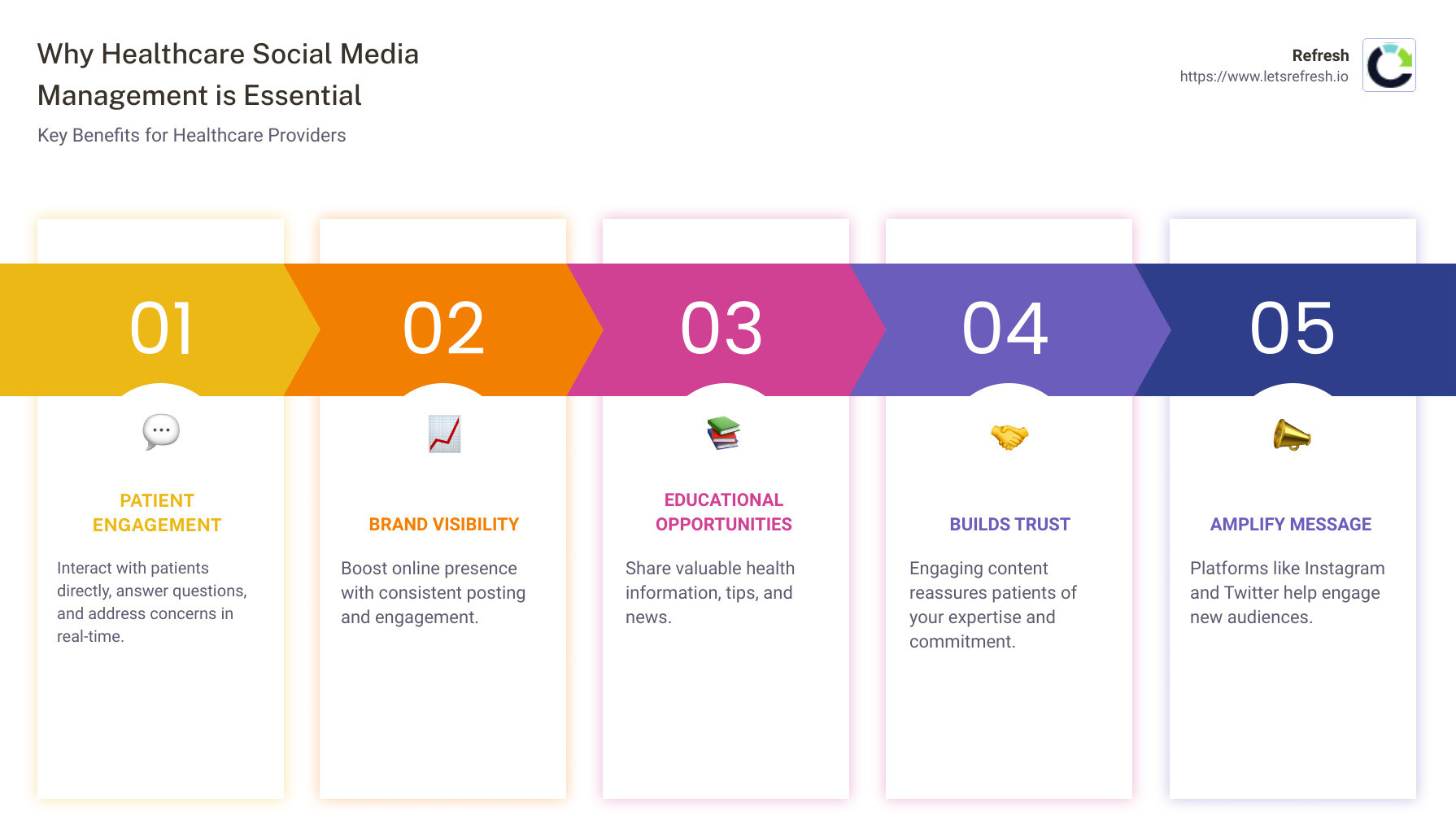Healthcare social media management is crucial for hospitals and healthcare centers looking to connect with patients and build their brand. Here’s a quick snapshot of why it's essential:
- Improves patient engagement: Social media allows direct interaction with patients, answering their questions and addressing their concerns in real-time.
- Improves brand visibility: Consistent posting and engagement boost your healthcare center's online presence.
- Educational opportunities: Share valuable health information, tips, and news.
- Builds trust: Engaging content reassures patients of your expertise and commitment.
Social media platforms like Facebook, Instagram, and Twitter have become indispensable tools for patient engagement and brand building in healthcare. They offer a direct line to your audience, allowing for personalized interactions and the dissemination of critical health-related information. This not only strengthens patient relationships but also solidifies your healthcare center's reputation as a trusted and up-to-date provider.
By sharing educational content, success stories, and real-life testimonials, healthcare providers can create a more informed patient community. Moreover, platforms like Instagram and Twitter help amplify your message and engage new audiences, keeping your brand at the forefront of healthcare discussions.
I’m Alexander Palmiere, founder of Refresh Digital Strategy. With years of expertise in healthcare social media management, I’ve helped numerous healthcare providers improve their online engagement, boost visibility, and build trust with their patients.
Let’s dive deeper into why social media is so crucial for healthcare.

Why Social Media is Essential for Healthcare
Patient Recommendations
Social media platforms are a goldmine for patient recommendations. When people search for healthcare providers, they often turn to social media for reviews and recommendations from others. According to research, approximately 90% of older adults have used social media to share or look for health information.
By maintaining an active and engaging social media presence, healthcare providers can encourage satisfied patients to share their positive experiences. Testimonials and success stories can be shared across platforms, creating a ripple effect that attracts new patients.
Health Information Sharing
Sharing accurate and timely health information is one of the most significant benefits of social media in healthcare. Providers can post about:
- Preventative health tips
- Wellness information
- Disease prevention strategies
For example, during the flu season, healthcare centers can share tips on how to avoid getting sick or what to do if you exhibit symptoms. This not only helps patients but also positions the healthcare provider as a reliable source of health information.
Brand Solidification
Social media is a powerful tool for brand solidification. By consistently posting valuable content, engaging with followers, and showcasing your expertise, you build a solid and trustworthy brand. This is crucial because patients are more likely to choose a healthcare provider they trust.
Engaging content types like videos, behind-the-scenes photos, and staff accomplishments can humanize your brand, making it more relatable and trustworthy. For instance, sharing a video of a doctor explaining a common procedure can explain the process and build patient confidence.
New Audience Reach
Social media allows healthcare providers to reach new audiences that they might not have been able to connect with otherwise. Platforms like Instagram and Twitter are particularly effective for this.
By using targeted social media marketing strategies, you can reach specific demographics, interests, and behaviors. This ensures that your message gets to the most relevant viewers, expanding your reach and attracting new patients.
Engaging with your community through social media also helps in building local partnerships and spreading awareness about your services. This can be particularly beneficial for specialized healthcare providers looking to attract patients with specific needs.
In the next section, we'll dive into Best Practices for Healthcare Social Media Management, including how to create an effective content strategy and plan your posts for maximum engagement.
Best Practices for Healthcare Social Media Management
Content Strategy & Planning
Creating a content strategy is the first step in effective healthcare social media management. A well-thought-out plan ensures your posts are timely, relevant, and engaging.
Content Creation involves generating high-quality posts that align with your growth objectives. This can include:
- Educational blog posts
- Infographics
- Patient testimonials
Planning is key. Use a social media calendar to schedule posts in advance. This helps maintain consistency and ensures that you're regularly updating your audience with fresh content.
Engaging Content Types
Different types of content can help you engage with your audience effectively. Here are some ideas:
- Videos: Short clips explaining medical procedures or health tips can grab attention quickly.
- Pictures: High-quality images of your team or facilities can humanize your brand.
- Testimonials: Sharing patient success stories can build trust and credibility.
- Community Participation: Highlight your involvement in local events or health fairs.
- Office Events: Showcase behind-the-scenes moments or staff celebrations to make your practice more relatable.
Platform-Specific Strategies
Different social media platforms require different approaches. Here’s how to optimize your strategy for each:
Facebook is excellent for reaching a broad audience. Use it to share:
- Longer posts
- Detailed articles
- Event announcements
Engage with your audience by responding to comments and messages promptly.
Instagram is all about visuals. Focus on:
- High-quality images
- Short videos
- Stories
Use relevant hashtags to increase your reach. For example, #HealthcareHeroes can spotlight your staff.
Twitter is great for real-time updates and quick interactions. Share:
- Health tips
- News updates
- Engage in Q&A sessions
Use hashtags to join broader conversations and increase visibility.
LinkedIn is ideal for professional networking. Post:
- Industry news
- Research findings
- Staff accomplishments
This platform can help you build connections with other healthcare professionals and organizations.
TikTok
TikTok is perfect for short, engaging videos. Consider:
- Educational clips
- Fun behind-the-scenes moments
- Challenges and trends
This platform can help you reach a younger audience effectively.
By following these best practices for healthcare social media management, you can create engaging, authentic, and high-quality content that resonates with your audience. Next, we'll explore tips for effective social media marketing in healthcare.
Tips for Effective Social Media Marketing in Healthcare
Share Preventative Health News
Sharing preventative health news is a fantastic way to keep your audience informed and engaged. Time-sensitive posts about health tips, wellness information, and disease prevention can educate your followers and help them make better health decisions.
For example, during flu season, you can share reminders about getting flu shots and tips on how to avoid getting sick. These kinds of posts build trust and position your organization as a reliable source of health information.
Engage and Educate Patients
Engaging and educating patients is crucial for effective social media marketing in healthcare. Interactive posts, Q&A sessions, and educational videos can provide valuable information while keeping your audience engaged.
Consider hosting live Q&A sessions where followers can ask questions about common health concerns. You can also create short educational videos explaining medical procedures or discussing new health studies. This not only educates your audience but also makes your organization more approachable.
Promote Events and New Treatments
Promoting events and new treatments can generate excitement and drive engagement. Use social media to announce upcoming events, share treatment updates, and celebrate patient success stories.
For instance, if you're hosting a health fair, create event announcements and share them on all your social media platforms. Highlighting new treatments or technologies can also attract attention. Sharing patient success stories related to these treatments can further improve credibility and trust.
Highlight Staff Accomplishments
Highlighting staff accomplishments can humanize your brand and foster a sense of community. Share posts about work anniversaries, staff achievements, and behind-the-scenes content to showcase the people who make your organization great.
For example, celebrate a nurse’s work anniversary with a dedicated post or share a behind-the-scenes look at a day in the life of your medical team. These posts can make your staff feel valued and help your audience connect with your organization on a personal level.
Accept User-Generated Content
User-generated content (UGC) is an excellent way to build community and trust. Encourage patients to share their testimonials, community stories, and user-submitted photos. Sharing UGC not only provides authentic social proof but also shows that you value your patients' experiences.
Invite your followers to share their health journeys or success stories and feature these posts on your social media channels. A simple repost with a heartfelt message of appreciation can go a long way in building loyalty and trust.
By following these tips for effective healthcare social media management, you can create engaging, informative, and authentic content that resonates with your audience. Next, we'll discuss how to manage risks and ethical considerations in healthcare social media.
Managing Risks and Ethical Considerations
Avoiding Misinformation
Misinformation can spread quickly on social media and can cause significant harm, especially in healthcare. To avoid this:
- Fact-check everything: Always verify the accuracy of the information before sharing. For instance, during the COVID-19 pandemic, misinformation ranged from 0.2% to 28.8% of posts, causing fear and panic. Use credible sources like government health websites and peer-reviewed journals.
- Use clear communication: Make sure your posts are easy to understand. Misunderstandings can lead to misinformation. For example, clearly explain the benefits and risks of new treatments.
- Monitor and correct: Regularly check your social media platforms for any misinformation. If you find any, correct it promptly and provide the accurate information.
Ensuring Patient Confidentiality
Patient confidentiality is a cornerstone of healthcare. Breaching it can damage trust and lead to legal issues.
- Follow privacy policies: Adhere to your organization’s privacy policies and state guidelines guarding patient privacy. Ensure all staff are familiar with these rules.
- Use consent forms: Before sharing any patient information or testimonials, get written consent. This is crucial to protect patient rights and maintain trust.
- Secure communication: Use secure methods to communicate with patients. Avoid discussing sensitive information on public platforms. Instead, use private messages or secure email.
Maintaining Professional Conduct
Maintaining a professional demeanor online is essential for healthcare providers. Unprofessional conduct can hurt your reputation and lead to disciplinary action.
- Post appropriate content: Ensure all posts are relevant and respectful. Avoid sharing anything that could be seen as unprofessional or offensive.
- Engage respectfully: Interact with followers in a respectful manner. Respond to comments and questions professionally, even if they are negative.
- Follow ethical guidelines: Adhere to ethical guidelines set by your organization and professional bodies. This includes respecting patient confidentiality and avoiding conflicts of interest.
By addressing these key areas, you can manage the risks and ethical considerations in healthcare social media management effectively.
Next, we'll answer some frequently asked questions about healthcare social media management.
Frequently Asked Questions about Healthcare Social Media Management
How is social media used in healthcare?
Research Communities: Social media platforms are essential for connecting healthcare professionals with research communities. These online spaces facilitate the sharing of medical studies, clinical trial results, and new treatment protocols. For example, platforms like LinkedIn and Twitter are popular among researchers for disseminating findings and collaborating on projects.
Practice Marketing: Social media is a powerful tool for marketing healthcare practices. By showcasing services, sharing patient testimonials, and highlighting staff expertise, healthcare providers can attract new patients. For instance, a dental clinic might use Instagram to post before-and-after photos of dental procedures, building trust and showcasing their work.
Health Promotion: Raising awareness about health issues is a critical function of social media in healthcare. Providers can share preventative health tips, wellness information, and updates on public health topics. During flu season, a hospital might use Facebook to remind the community about the importance of getting vaccinated and provide information on where to get the flu shot.
How to market healthcare on social media?
Preventative Health News: Sharing timely health news and tips can engage your audience and educate them. For example, posting about the dangers of vaping or the importance of regular health screenings can attract attention and provide value to your followers.
Patient Engagement: Interactive posts like Q&A sessions, polls, and educational videos can boost patient engagement. Mayo Clinic’s TikTok account, for example, uses short-form videos to answer common health questions and provide a glimpse into hospital life.
Event Promotion: Announcing events such as health fairs, vaccination drives, or new treatment launches can draw community interest. Use platforms like Facebook Events to create and share event details, making it easy for people to RSVP and share.
Staff Highlights: Showcasing your staff’s achievements and milestones can humanize your organization. Celebrate work anniversaries, share behind-the-scenes content, and highlight staff accomplishments to build a connection with your audience.
User-Generated Content: Encourage patients and community members to share their experiences. User-generated content, like patient testimonials and community stories, can build trust and authenticity. Reposting these stories with a thank you message can strengthen your relationship with your audience.
Which social media platform is best for healthcare?
Facebook: Ideal for reaching a broad audience, including older adults. It’s great for sharing detailed posts, event announcements, and health tips. Facebook’s Groups feature can also foster community engagement around specific health topics.
Instagram: Perfect for visual storytelling and reaching a younger demographic. Use it to share photos and videos of office events, patient success stories, and health tips. Instagram Stories and Reels are excellent for engaging content.
Twitter: Best for real-time updates and connecting with healthcare professionals. Use it for sharing the latest research, live-tweeting events, and participating in health-related discussions. Twitter’s brevity is perfect for quick updates and links to longer content.
LinkedIn: Focused on professional networking and B2B marketing. Ideal for sharing professional achievements, research publications, and connecting with other healthcare professionals. LinkedIn is also a good platform for recruiting new talent.
TikTok: Great for reaching a younger audience with engaging, short-form videos. Use it for educational content, health challenges, and behind-the-scenes looks at healthcare facilities. TikTok’s algorithm can help your content reach a wide audience quickly.
By leveraging these platforms effectively, healthcare providers can improve their social media management efforts, ensuring they reach and engage with their target audiences effectively.
Conclusion
In summary, healthcare social media management is essential for modern healthcare providers. It offers a unique opportunity to engage with patients, build your brand, and share valuable health information. Here’s a quick recap of best practices:
- Develop a Content Strategy: Plan your content around key themes like patient education, staff highlights, and health tips. Use a social media calendar to stay organized.
- Create Engaging Content: Use videos, pictures, and testimonials to capture attention. Community participation and office events also make for great posts.
- Use Platform-Specific Strategies: Tailor your approach for each platform. Facebook is great for detailed posts and event announcements, while Instagram excels in visual storytelling. Twitter is ideal for real-time updates, LinkedIn for professional networking, and TikTok for engaging younger audiences.
- Engage and Educate: Interactive posts like Q&A sessions and educational videos can boost engagement. Highlighting staff accomplishments and sharing user-generated content can build trust and authenticity.
- Manage Risks and Ethical Considerations: Always ensure patient confidentiality and avoid misinformation. Adhere to professional conduct and regulatory compliance.
Importance of Social Media
Social media is not just a marketing tool; it’s a platform for building relationships and trust. It helps healthcare providers:
- Reach a wider audience: Social media platforms are where people spend their time. By being active, you can connect with both current and potential patients.
- Share valuable information: Educate your community about health issues, preventative care, and new treatments.
- Humanize your brand: Show the faces behind the scenes, celebrate staff, and share patient success stories to build a genuine connection.
Refresh's Role in Healthcare Social Media Management
At Refresh, we specialize in helping healthcare providers maximize their social media presence. Our services include:
- Customized Social Media Pages: We tailor your social media profiles to reflect your brand.
- Personalized Social Media Strategy: Our experts develop strategies that align with your goals and values.
- High-Engagement Posts: We create content designed to engage and connect with your audience.
By partnering with us, you can ensure that your healthcare social media management is effective, ethical, and engaging.
Ready to lift your social media game? Learn more about our services.
By following these best practices, you can harness the power of social media to improve patient outcomes, advance medical knowledge, and improve the overall healthcare experience. Let’s make social media work for your healthcare practice!



.avif)

.avif)
